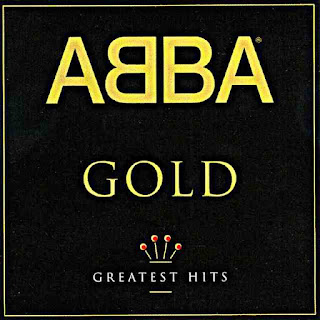I once listened to one Abba album one time.
About ten years ago I happened upon Abba Gold Greatest Hits in Leslie's CD collection. I popped it into the player and was surprised that it didn't suck. In fact there was just enough musical interest for me to be surprised that I was enjoying it.
The important words in that last sentence were "just enough". If the disc had held any less musical interest for me, even the smallest smidgen, I would not have enjoyed it.
Abba Gold Greatest Hits may be one of the 40 best selling albums ever - but I decided there was no need for me to listen to it again for years and years to come.

In preparation for seeing the movie this weekend I hunted the album down, ripped it to my iPod and listened for a second time. The stupid lyrics, disco thumping and ancient synth sounds were still there. But I again discovered that each song had a couple small musical aspects - a chord change here, a little bit of counterpoint there - that kept my attention from wandering too far. One song, Money Money Money, even has a kind of mixed meter moment.
After this second listening I concluded that the album, in my subjective analysis, represents a quantum of musical interest: the minimum amount of musical content sufficient to hold my attention once per decade. I decided to name this measurement an ABBA. In other words Abba Gold Greatest Hits is now the reference standard representing one ABBA of musical interest.
ABBAs can be used as a measurement scale of musical interest, a way to compare the interest level of different musical works.
The bottom of the scale, zero ABBAs, would (of course) be represented by my Music In Hell list: for example Joni Mitchell or Willie Nelson.
The top of the scale, arbitrarily set at twelve ABBAS, is equivalent to one GOLDBERG, represented by my very great interest in Bach's Goldberg Variations especially as played by Glenn Gould.
The ABBA scale is patterned after the scale of sound pressure, measured in Bels, which is commonly used by musicians. It is logarithmic. This means that one Bel or one ABBA represents a 10-fold increase. For day to day use deciABBAs (one tenth of an ABBA) will be more practical.
There you have it - Science Has Spoken! Bach's Goldberg Variations is one trillion times more interesting than Willie Nelson but only one hundred billion times more interesting than Abba Gold Greatest Hits.
By the way, the movie Mama Mia! didn't score any higher than the album - it held my interest, but no more, so it represents exactly one ABBA - and it additionally proves that ex-James Bond actors can't sing. QED.
ADDENDUM: Thanks to Palm Axis for the link to this fascinating video: (see comments).
Mama Mia! - Based On A True Story.
deciABBA Tags: ABBA. . . Mama Mia!. . . Abba Gold Greatest Hits. . . Money Money Money. . . deciBel. . . Goldberg Variations. . . Glenn Gould
5 comments :
I have something from all of the aforementioned. Isn't disliking Jonie Mitchel considered treason? A friend sent me this link under the heading "At Last, Something Interesting About ABBA" Seems the ABBA brunette was conceived under Hitler's super baby program. On my post Radiology " " is a link and in the post's comments, a discussion of LA 80's art bands (among other things).
Behind ABBA's success were high production standards and a producer/manager named Stikkan (Stig ) Andersson. He also wrote many of their biggest hits. This cat is sort of like, well, take George Martin away from The Beatles, or Giorgio Moroder away from Donna Summer and you might get the picture.
I received this comment from Sammy, Mixed Meters' reader at Oxford:
Your recent blog post on MM co-incided with a family trip to the Mama Mia movie, and I must say I was greatly dissapointed once again in my favourite ABBA song not being deemed worthy to be included. Of course the run of the mill ABBA hits were all disco diddys, but this one song might be worth a few ABBA's on your scale? Its the last one they ever did: The Day Before You Came. A deliciously dark one, with perhaps a smidgin of more musical interest. The dark stuff is what I like, goes with my usual listening pleasure.
Now, as a young boy growing up in Belgium during ABBA mania, Agnetha was the stuff dreams were made off. Blond, foreign, wonderful accent, sultry looks, life long fascination started, and she did mature nicely. OK I did get a bit of a transient fixation on Olivia Newton-John too, but that only lasted a year or two. Must have been those tight leather trousers in Grease. That passed though. But Agnetha verus Xena, no contest, Agnetha wins every time.
I was coerced into seeing Mamma Mia (the play), which ended up being great... as for the movie version, sounds fun, though it's awkward to think of ol' Pierce trying to sing, yeeesh
Red Zebra wrote: "Behind ABBA's success were high production standards and a producer/manager named Stikkan (Stig ) Andersson. He also wrote many of their biggest hits."
Stig "Stikkan" Andersson didn't write a single ABBA-song on his own. The songs were co-written with Bjorn Ulvaeus and Benny Andersson, who wrote most of the Abba-songs. Don't distort the facts, please.
Post a Comment